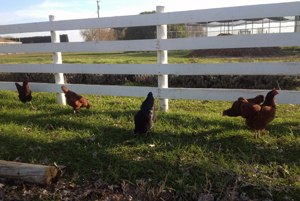
Shelly McMahon, our egg supplier, has been farming in some form or fashion for nearly 25 years. Her own parents were not involved in agriculture, but she thinks it’s in her blood. Her grandparents had a dairy farm in Wisconsin and she fondly remembers her visits with them. Picking berries, wheat fields and all the cows always left her with a good feeling.
She moved out to Brentwood 25 years ago and bought land that was being used for oat production. She slowly started taking on little patches of the land to grow food for Farmers Markets and for a few local restaurants. Her family bought a few hens so they could have their own fresh eggs. When she had excess eggs she’d just give them away to friends and neighbors. People really liked them, so she got a few more chickens to compliment the crops she brought to Market. That small start with egg production nine years ago has evolved into a full time job, or as most farming goes, more than full time.
Shelly has 8 acres of pasture for her 1,500 chickens to roam. She calls her production practices the “old new way”. Before large-scale commercial egg farming took hold as the predominant method of egg production, hens were pastured. Today the term pastured eggs means that the hens are actually out in pasture for the bulk of the day, not that they simply have access to pasture. Many cage free operations have up to 10,000 chickens in a barn with a small door way at the end to provide access to pasture, but hens don’t really like going through little doors and are not likely to be spend much time outside.
Shelly’s hens, or girls as she calls them, spend most of the day outside foraging for food. She estimates that bugs and grass makes up about 70% of their diet. The other 30% is from supplemental feed that is a mix of grains. Her coops provide shelter from wind and sun, and roosts for the hens to sleep up high in comfort and safety from predators, but the coops are completely open on two sides. Shelly puts out supplemental feed in the morning, but will not keep the feed trays full. Once the feed is gone, the hens need to get outside to scratch around to find their food.
The prized dark yellow to orange yokes in pastured eggs are a result of the hen’s diet. The richer more pronounced flavor associated with darker yolks is from a diet high in bugs and grass.
Shelly says her days are never dull when working outdoors among the chatter of her hens. With longer and warmer days, Shelly’s hens are making their way into peek laying season. Enjoy a dozen of their eggs next week and add some onto your box!
Follow Shelly on Facebook at Shelly’s Farm Fresh Eggs! or drop her a line at shelly@shellysfarmfresh.com

 Follow
Follow
